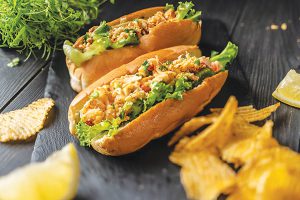Bloomberg
On November 14 in Sharm El-Sheikh, representatives from nine countries sat down to dinner. It was the start of the second week of COP27, but this was no panel discussion or debate over loss and damage. The dinner, hosted by California-based startup Good Meat, Washington DC-based nonprofit the Good Food Institute (GFI), and the country of Singapore, was instead a celebration of the main dish: cultivated chicken, or meat grown from animal cells in a bioreactor.
At the moment, Singapore is the only place in the world that permits the commercial sale of cultivated protein, also known as lab-grown meat, cultured meat or cell-based meat. But chicken isn’t its only focus. As climate change threatens global marine ecosystems, the city-state is also leading a charge to allow, regulate, and ultimately normalize the commercial sale of cultivated seafood. Singapore’s enthusiasm, driven by the local diet and its own reliance on food imports, is matched by that of dozens of startups around the world, all of which are exploring ways to grow cell-based oysters, lobsters, and other marine species in laboratory settings — and figuring out how to get consumers interested in eating them.
The science behind cell-based meat isn’t new — cell cultures were first used in medical research in 1907 — but it has yet to see much application for fish. Seafood is, however, a ripe space for innovation. Humans eat more than twice as much of it today as they did in 1960: Fish consumption has been rising at almost double the rate of population growth. And seafood transportation often requires long-haul airlifting, resulting in copious greenhouse-gas emissions.
The fishing industry is also among the most vulnerable to a changing climate, as ocean acidification compromises marine habitats and warmer seawater shifts the distribution pattern of fish stocks. Less than two thirds of those stocks are now within biologically sustainable levels, down from 90% in 1974, according to the Food and Agriculture Organization.
The decline in wild catches cannot be easily offset by aquaculture either, which has itself fallen victim to climate change-driven extreme weather.
 The Gulf Time Newspaper One of the finest business newspapers in the UAE brought to you by our professional writers and editors.
The Gulf Time Newspaper One of the finest business newspapers in the UAE brought to you by our professional writers and editors.
